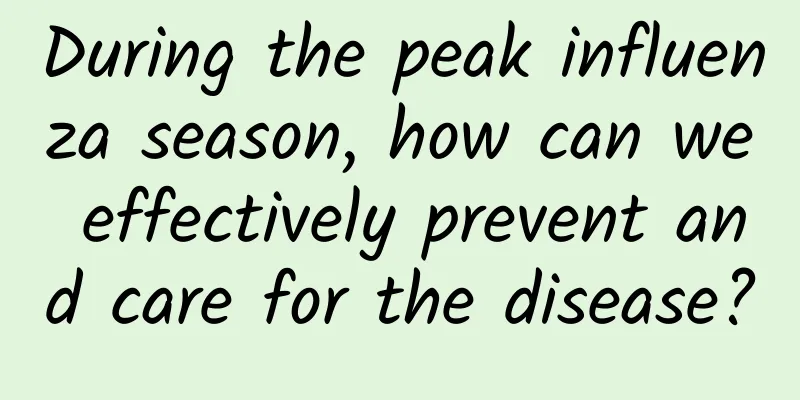During the peak influenza season, how can we effectively prevent and care for the disease?

|
In real life, influenza is a troublesome adverse symptom. Patients have severe systemic symptoms, mainly manifested as high fever, chills, headache, fatigue, loss of appetite, lack of energy, muscle aches, etc., especially for patients with underlying diseases, which may induce some serious complications and increase health risks. Influenza can have a serious impact on the patient's quality of life, work, and study. Some patients with weaker constitutions, such as infants and the elderly, may also suffer from toxic shock, bacterial pneumonia, etc., which may even threaten the patient's life safety [1]. So how can we effectively prevent the occurrence of influenza in winter and spring when influenza is prevalent? If you get influenza, what are the symptomatic care measures? Let's find out below! 1. Recommendations for preventing influenza 1. Influenza vaccination: This is one of the most effective preventive measures against influenza. It can significantly reduce the risk of infection and improve symptoms after infection, thereby reducing the risk of influenza virus infection and serious complications. The "Technical Guidelines for Influenza Vaccination in China" recommends that children aged 6 months to 5 years, people aged 60 years and above, patients with chronic diseases, medical staff, family members and caregivers of infants under 6 months old, and pregnant women or women who are preparing to become pregnant during the influenza season should be given priority for vaccination. The vaccine is updated every year based on changes in virus strains in epidemiological data. To ensure that the vaccinated population is protected to the greatest extent, it is recommended to get the influenza vaccine before the influenza season arrives that year [2]. It is recommended that patients who need to be vaccinated with influenza vaccine should do so in September or October each year. Influenza outbreaks and epidemics usually occur in winter and spring. Patients who receive influenza vaccine in advance can effectively prevent influenza and related complications. In addition, patients need to pay attention to the fact that they should not catch a cold, have a cold or have a fever before vaccination. In addition, after vaccination, it is recommended that patients should be observed for 30 minutes and leave only if no complications occur. 2. Promote a healthy lifestyle: A healthy lifestyle helps improve immunity, including: a reasonable diet, a balanced diet, adequate intake of vitamins and minerals, moderate physical exercise and adequate sleep. 3. Maintain good personal hygiene habits: This is an important means to prevent respiratory infectious diseases such as influenza. The main measures include: wash hands with soap and warm water, especially after touching the mouth, nose and eyes; minimize activities in crowded places and avoid contact with patients with respiratory infections; maintain good respiratory hygiene habits, cover your mouth and nose with tissues, towels, etc. when coughing or sneezing; regularly clean and disinfect commonly used items and surfaces; keep the indoor environment clean, with plenty of sunlight and regular ventilation. 2. Symptomatic nursing measures Symptomatic care can significantly improve the clinical efficacy of influenza patients, accelerate their recovery and improve their prognosis. 1. The room should have fresh air, plenty of sunlight, appropriate temperature and humidity. Keep the room temperature at 22-24℃ and the relative humidity at 50-60%. Ventilate the room every morning and evening for 30 minutes each time. 2. Appropriate isolation. Due to the high contagiousness of influenza, home isolation should be implemented if conditions permit, and the patient should live alone. The isolation period is from the onset of the disease to 48 hours after the fever subsides. Avoid going to public places unless necessary, wear a mask, and change the mask every 4 hours to prevent cross infection. 3. Daily utensils used by patients should be disinfected. Boiling or sun exposure can be used to prevent the virus from being transmitted to other people through the air or water. 4. Patients with fever should rest in bed, keep warm, and prevent re-suscitation. They should drink plenty of water to promote the excretion of toxins in the body, which has a certain cooling effect. If the body temperature exceeds 38.5℃, physical cooling can be given, such as 75% alcohol bath (do not wipe the chest, back, and neck), and fever-reducing patches on the head. If the fever-reducing effect is not good, seek medical treatment in time. 5. Do not eat spicy or greasy food to avoid indigestion. Daily three meals should be nutritious and easy to digest. When the fever is high, you can eat liquid or semi-liquid food, such as millet porridge, vegetable porridge, white noodles, etc., in small meals. 6. Keep the oropharynx and nasal cavity clean, brush your teeth in the morning and evening, and rinse your mouth with light salt water or warm water after eating to prevent secondary infection. 7. Take more physical exercises to strengthen your physical fitness. Add or remove clothes according to weather conditions. During epidemic seasons, avoid crowded public places to reduce the risk of infection. 8. Take medicine or intravenous infusion on time as prescribed by the doctor. Do not stop taking medicine without authorization even if the symptoms improve. If the high fever persists and the flu symptoms worsen, you must go to a regular hospital for examination and treatment in time. 9. Psychological care: Nurses should provide appropriate psychological care to patients according to their education level, age and condition. If the patient is older, active communication and communication should be conducted to calm the patient and enhance the patient's confidence in treatment; if the patient is younger, psychological counseling should be provided to the family members while calming the patient to better cooperate with the treatment and promote recovery. References: 【1】Gao Shan. Efficacy of combined traditional Chinese and western medicine in treating influenza in the elderly in all seasons [J]. Chinese Journal of Gerontology, 2012, 328): 1706-1708. 【2】Healthy China |
>>: Tumor Rumors | Will improving nutrition make tumors grow faster?
Recommend
What to do if your belly sags after childbirth
Many women face a problem after giving birth, whi...
How to do flexibility yoga
Yoga is an imported health-care exercise. Because...
What causes breast pain during breastfeeding?
A breastfeeding mother contacts her child through...
Brown discharge during pregnancy
In today's environment, air pollution is beco...
How to make breasts bigger quickly
Breast size is very important for a woman's l...
A woman drinks a bowl of Tremella and red dates soup every day
Women nowadays are under great pressure every day...
Will being alone for a long time affect your social skills? See how many of these behaviors you meet
During the epidemic, many people have been quaran...
I get hungry as soon as night falls and crave food. Is there any help?
Many people have experienced being hungry at nigh...
Where are the labia minora?
If the foreskin of the vulva is long, the secreti...
Endometrial double layer thickness 7mm
According to the clinical summary of experts, the...
How to deal with increased milk supply after induced labor?
After induced abortion, women still face many pro...
Causes of irregular uterine bleeding
When a woman's uterus shows abnormal conditio...
Eating out twice a day increases the risk of all-cause mortality by 49% and cancer mortality by 67%.
Nowadays, people living in cities are so busy tha...
What causes women's night sweats?
Nowadays, many female friends often suffer from n...
Your blood vessels are quietly developing plaques and hardening! Do this and the "plaques" may shrink or even disappear
This article was reviewed by Fang Jie, Associate ...



![[Medical Q&A] How to provide first aid when an elderly person chokes?](/upload/images/67f0e86364d63.webp)





